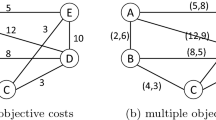Abstract
This publication investigates characteristics of and algorithms for the quite new and complex Bi-Objective Traveling Thief Problem, where the well-known Traveling Salesman Problem and Binary Knapsack Problem interact. The interdependence of these two components builds an interwoven system where solving one subproblem separately does not solve the overall problem. The objective space of the Bi-Objective Traveling Thief Problem has through the interaction of two discrete subproblems some interesting properties which are investigated. We propose different kind of algorithms to solve the Bi-Objective Traveling Thief Problem. The first proposed deterministic algorithm picks items on tours calculated by a Traveling Salesman Problem Solver greedily. As an extension, the greedy strategy is substituted by a Knapsack Problem Solver and the resulting Pareto front is locally optimized. These methods serve as a references for the performance of multi-objective evolutionary algorithms. Additional experiments on evolutionary factory and recombination operators are presented. The obtained results provide insights into principles of an exemplary bi-objective interwoven system and new starting points for ongoing research.
Access this chapter
Tax calculation will be finalised at checkout
Purchases are for personal use only
Similar content being viewed by others
References
Ishibushi, H., Klamroth, K., Mostaghim, S., Naujoks, B., Poles, S., Purshouse, R., Rudolph, G., Ruzika, S., Sayin, S., Wiecek, M.M., Yao, X.: Multiobjective Optimization for Interwoven Systems. Schloss Dagstuhl-Leibniz-Zentrum fuer Informatik (2015)
Applegate, D.L., Bixby, R.E., Chvatal, V., Cook, W.J.: The Traveling Salesman Problem: A Computational Study. Princeton Series in Applied Mathematics. Princeton University Press, Princeton (2007)
Lagoudakis, M.G.: The 0–1 Knapsack Problem - An Introductory Survey (1996)
Bonyadi, M.R., Michalewicz, Z., Barone, L.: The travelling thief problem: the first step in the transition from theoretical problems to realistic problems. In: IEEE Congress on Evolutionary Computation, pp. 1037–1044. IEEE (2013)
Polyakovskiy, S., Bonyadi, M.R., Wagner, M., Michalewicz, Z., Neumann, F.: A comprehensive benchmark set and heuristics for the traveling thief problem. In: Proceedings of the 2014 Annual Conference on Genetic and Evolutionary Computation, ser. GECCO 2014, pp. 477–484. ACM, New York (2014). http://doi.acm.org/10.1145/2576768.2598249
Reinelt, G.: TSPLIB - A t.s.p. library. Universität Augsburg, Institut für Mathematik, Augsburg. Technical report 250 (1990)
Faulkner, H., Polyakovskiy, S., Schultz, T., Wagner, M.: Approximate approaches to the traveling thief problem. In: Proceedings of the 2015 on Genetic and Evolutionary Computation Conference, ser. GECCO 2015, pp. 385–392. ACM, New York (2015). http://doi.acm.org/10.1145/2739480.2754716
Bonyadi, M.R., Michalewicz, Z., Przybylek, M.R., Wierzbicki, A.: Socially inspired algorithms for the travelling thief problem. In: Proceedings of the 2014 Annual Conference on Genetic and Evolutionary Computation, ser. GECCO 2014, pp. 421–428. ACM, New York (2014). http://doi.acm.org/10.1145/2576768.2598367
Birkedal, R.: Design, implementation, comparison of randomized search heuristics for the traveling thief problem, Master’s thesis. Technical University of Denmark, Department of Applied Mathematics, Computer Science, Richard Petersens Plads, Building 324, DK-2800 Kgs. Lyngby, Denmark, compute@compute.dtu.dk (2015). http://www.compute.dtu.dk/English.aspx
Mei, Y., Li, X., Salim, F., Yao, X.: Heuristic evolution with genetic programming for traveling thief problem. In: IEEE Congress on Evolutionary Computation, CEC 2015, Sendai, Japan, 25–28 May 2015, pp. 2753–2760 (2015). http://dx.doi.org/10.1109/CEC.2015.7257230
Mei, Y., Li, X., Yao, X.: On investigation of interdependence between sub-problems of the travelling thief problem. Soft Comput., 1–16 (2014). http://dx.doi.org/10.1007/s00500-014-1487-2
Mei, Y., Li, X., Yao, X.: Improving efficiency of heuristics for the large scale traveling thief problem. In: Proceedings of the Simulated Evolution, Learning - 10th International Conference, SEAL 2014, Dunedin, New Zealand, 15–18 December 2014, pp. 631–643 (2014). http://dx.doi.org/10.1007/978-3-319-13563-2_53
Wachter, C.: Solving the travelling thief problem with an evolutionary algorithm. Diplomarbeit, Technischen Universitt Wien (2015)
Applegate, D., Cook, W., Rohe, A.: Chained lin-kernighan for large traveling salesman problems. INFORMS J. Comput. 15(1), 82–92 (2003). http://dx.doi.org/10.1287/ijoc.15.1.82.15157
Deb, K., Pratap, A., Agarwal, S., Meyarivan, T.: A fast elitist multi-objective genetic algorithm: NSGA-II. IEEE Trans. Evol. Comput. 6, 182–197 (2000)
Fonseca, V.G., Fonseca, C.M.: The attainment-function approach to stochastic multiobjective optimizer assessment and comparison. In: Experimental Methods for the Analysis of Optimization Algorithms, pp. 103–130. Springer, Heidelberg (2010). http://dx.doi.org/10.1007/978-3-642-02538-9_5
Martello, S., Pisinger, D., Toth, P.: Dynamic programming and strong bounds for the 0–1 knapsack problem. Manage. Sci. 45(3), 414–424 (1999)
Oliver, I.M., Smith, D.J., Holland, J.R.C.: A study of permutation crossover operators on the traveling salesman problem. In: Proceedings of the Second International Conference on Genetic Algorithms on Genetic Algorithms and their Application, pp. 224–230. L.E. Associates Inc., Mahwah (1987)
Acknowledgment
This work was supported by a fellowship within the FITweltweit programme of the German Academic Exchange Service (DAAD).
Author information
Authors and Affiliations
Corresponding author
Editor information
Editors and Affiliations
Rights and permissions
Copyright information
© 2017 Springer International Publishing AG
About this paper
Cite this paper
Blank, J., Deb, K., Mostaghim, S. (2017). Solving the Bi-objective Traveling Thief Problem with Multi-objective Evolutionary Algorithms. In: Trautmann, H., et al. Evolutionary Multi-Criterion Optimization. EMO 2017. Lecture Notes in Computer Science(), vol 10173. Springer, Cham. https://doi.org/10.1007/978-3-319-54157-0_4
Download citation
DOI: https://doi.org/10.1007/978-3-319-54157-0_4
Published:
Publisher Name: Springer, Cham
Print ISBN: 978-3-319-54156-3
Online ISBN: 978-3-319-54157-0
eBook Packages: Computer ScienceComputer Science (R0)




